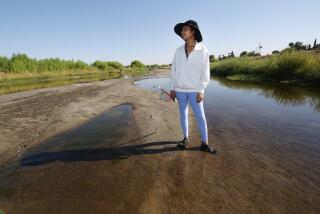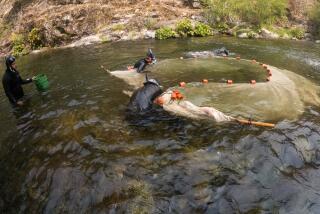Trolling for answers
You probably know the proverb, “Give a man a fish and you feed him for a day. Teach him how to fish and you feed him for a lifetime.” There are few fish, or at least few salmon, to give a man this year with the collapse of the California salmon fishery; the number of chinook returning to spawn in the Sacramento River has dwindled to about a 10th of the run a few years ago. The response from state representatives shows they aren’t as versed in ancient Chinese wisdom as we’d like.
Federal regulators had no choice but to cancel the salmon fishing season, which normally would have opened Thursday from the Mexican border to northern Oregon. This represents a loss of about $250 million to the state -- and to the fishermen who already were struggling under ever-tightening restrictions. It also means shoppers will hunt hard to find the prized “king” salmon, as chinook are called in stores, and will pay drastically higher prices.
Even more alarming is the uncertainty over what is to blame for this sudden collapse. This isn’t an overfishing situation, where giving the fish a break will bring them back to abundance. The prevailing theory among scientists is that a change of ocean currents, perhaps brought about by global warming, is lowering nutrient levels where the salmon swim. Because salmon populations farther north are also down, but not by as much, the theory makes sense. If that’s the case, the salmon may continue to disappear.
But there’s also evidence that mistreatment of the Sacramento-San Joaquin River Delta has exacerbated the situation, and this we can do something about. The salmon isn’t the only species declining dramatically in the area, where falling populations of the tiny delta smelt prompted a judge in December to order a cutback in pumping water for export. That order might also help the salmon. In addition, urban and agricultural runoff takes an increasing toll on the delta and the fish that depend on it.
The California congressional delegation is asking for as much as $150 million in disaster aid for the fishing industry. Although we sympathize with the fishermen’s plight, a one-year bailout amounts to giving them a fish so they can eat today. The industry does need federal aid, but in the form of farsighted projects that will keep the salmon feeding us, and the fishing industry, for the future: dam removal, pollution controls, water projects to take pressure off the delta and expanded fishery operations to coddle what chinook we have.
More to Read
Sign up for The Wild
We’ll help you find the best places to hike, bike and run, as well as the perfect silent spots for meditation and yoga.
You may occasionally receive promotional content from the Los Angeles Times.






